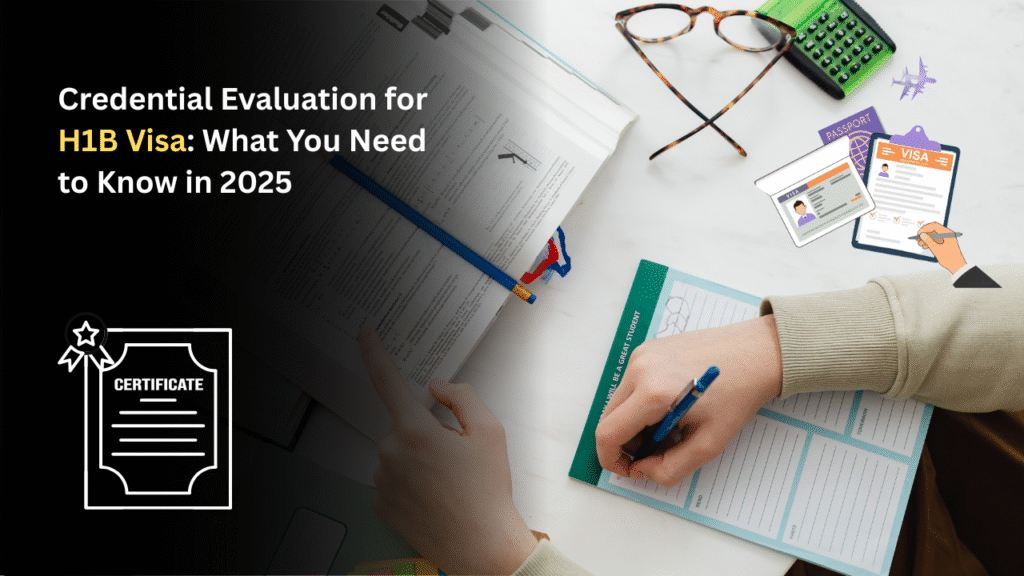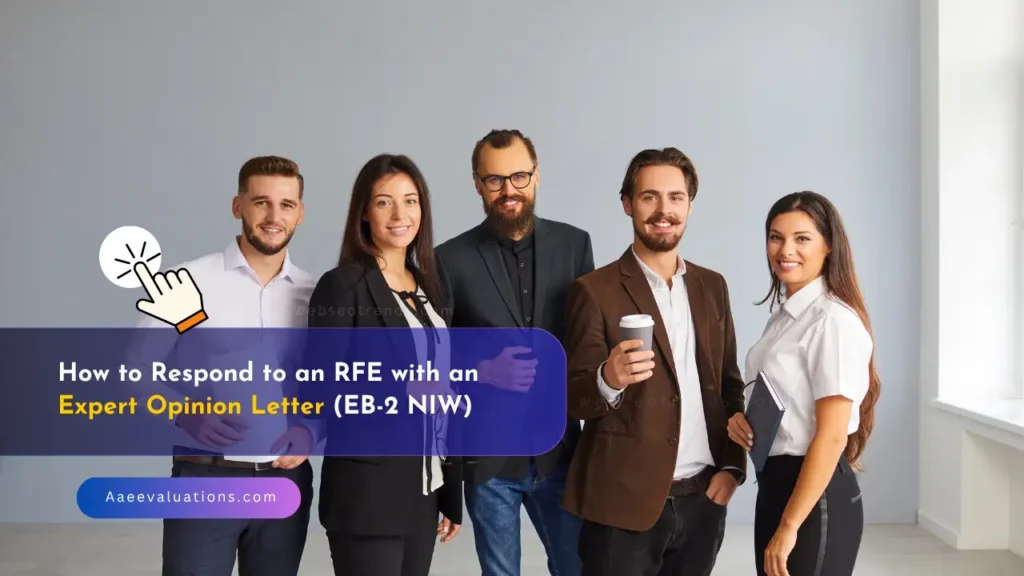Credential Evaluation for H1B Visa: Verify Your Credentials for US Employment
Your American dream might depend on how well you handle the educational equivalency evaluation for your H1B visa application.
The H-1B visa program stands out as one of the most popular non-immigrant work visas. It gives foreign professionals job opportunities in fields of all types – from engineering and medicine to IT. But lining up your foreign educational qualifications with U.S. standards can be tricky. Your application process could face complications if your foreign degrees don’t match U.S. standards, which often leads to Requests for Evidence (RFEs).
The credential evaluation process for H1B can feel overwhelming. USCIS looks at the AACRAO EDGE database to check your educational equivalency. You need to prove your job qualifies as a specialty occupation, which usually needs a bachelor’s degree or something similar. A vital point to remember: three years of progressive work experience equals one year of U.S. university study. That’s why you need a proper education evaluation h1b assessment.
A USCIS-approved education evaluation helps verify your qualifications to potential employers and improves your job prospects by a lot. The H-1B visa also lets you apply for a Green Card while keeping your H-1B status. This dual intent feature makes it even more important to get your educational evaluation right from the start.
What is Credential Evaluation for H1B Visa?
H1B visa applicants with foreign education should know how credential evaluation works.
Let me explain this process and why it matters for your visa experience.
Definition and purpose
Credential evaluation for H1B visa helps assess how your foreign education matches up with US academic standards. This process takes your international qualifications and shows what they mean in the American system. Professional evaluation agencies who know global education systems inside and out handle these assessments.
You need this evaluation to show you meet the basic educational requirements for H1B eligibility. USCIS requires applicants to have at least a US bachelor’s degree or something equivalent. Foreign degree holders must get this formal verification. Your application might get rejected without proper evaluation, even with great qualifications.
A complete credential evaluation for H1B has:
- An equivalency statement for each degree or diploma
- Information about attendance dates and institution location
- Details about the educational institution and programs
- A profile of entrance criteria and typical length of study
- A recommendation of the US equivalent for each credential earned
H1B applicants typically deal with two main types of evaluations:
- Foreign Degree Evaluation (also called Diploma Evaluation or Document-by-Document Evaluation)
- Transcript Evaluation (also called Course-by-Course Evaluation)
Your specific situation and educational background will determine which type you need.
How it fits into the H1B process
The credential evaluation plays a key role in your H1B application, especially if you studied outside the United States. USCIS rules say you must prove you have something equal to a US bachelor’s degree in your specialty field.
This evaluation gives solid proof that your foreign qualifications meet immigration requirements. USCIS won’t accept your own assessment of educational equivalency. You must get an official evaluation from an accredited service. Immigration officers can easily understand and assess this standardized information.
Your credential evaluation report becomes part of your supporting documentation for the H1B petition. The report details your educational credentials, including your degree, graduation year, school name, and field of study. It also gives the evaluator’s professional opinion about US equivalency.
Students from non-US schools must get this evaluation – it’s not optional. Many universities and employers who work with H1B applicants know USCIS requires this evaluation for foreign degrees.
The evaluation becomes even more valuable if you have a three-year degree or a mix of education and experience. Evaluators can often show that your combined qualifications match or exceed US degree requirements. This helps build a stronger case.
Credential evaluation takes your foreign qualifications and presents them in a way US immigration authorities understand clearly. This removes a major roadblock from your visa experience.
Who Needs an Education Evaluation for H1B?
H1B visa applicants don’t always need credential evaluation. Let me explain who needs this significant assessment in 2025.
Foreign degree holders
Your H1B application needs an educational equivalency evaluation if you earned your highest degree outside the United States. USCIS officials want credential evaluations that help them understand foreign qualifications in American terms. This evaluation helps reshape the scene of your foreign credentials into something U.S. immigration officials can easily assess.
Most foreign degree holders find this process simple. A 4-year bachelor’s degree from an accredited foreign university matches a U.S. bachelor’s degree in most cases. Immigration officers look at your educational credentials and compare them with trusted resources to determine U.S. degree equivalency.
USCIS needs more than just your word. Immigration officers look at opinions from education credential evaluators along with your actual educational documents. Empty opinions without solid evidence don’t carry much weight.
Applicants with mixed education and experience
Some H1B applicants have non-traditional educational backgrounds. You might still qualify for an H1B visa through equivalency provisions if you have both formal education and professional experience.
Rules allow combinations of work experience and university study. The “three-for-one rule” helps if your education falls short of a full 4-year bachelor’s degree. This rule lets you substitute three years of progressive work experience for one year of U.S. university study.
To cite an instance, see these scenarios:
- A 3-year foreign degree plus 3 years of relevant work experience equals a 4-year U.S. bachelor’s degree
- Twelve years of relevant progressive experience might equal a bachelor’s degree without formal education
This equivalency option works only for H1B classification, not for PERM Labor Certification.
Cases with 3-year degrees
Three-year bachelor’s degrees create special challenges for H1B applicants. Degrees from countries like India often get Requests for Evidence because they don’t match U.S. 4-year bachelor’s degrees.
Three-year degree holders have several options:
- Work experience conversion through credential evaluation offers the best way to address the “missing fourth year” issue
- USCIS no longer accepts classroom clock hours conversion (Carnegie Unit conversion)
- Your work experience must show increasing responsibility in your field and prove on-the-job education
Indian 3-year degrees face extra scrutiny due to their twelve years of pre-college education instead of thirteen. USCIS focuses on the missing fourth year even though these programs often have more classroom hours than U.S. 4-year degrees.
Immigration requirements keep changing. Three-year degree holders need experienced evaluators who know current USCIS expectations to get H1B approval.
How to Get a Credential Evaluation for H1B
The credential evaluation process for H1B visas follows four significant steps that I’ll outline below.
Getting this right matters since USCIS treats these evaluations as advisory, and immigration officers ended up making the final determination.
Step 1: Choose a USCIS-approved agency (AAE Evaluations)
Your H1B application’s success starts with picking a reputable evaluation service. USCIS values evaluations from independent credentials evaluators who make credible, logical, and well-documented cases for equivalency determinations.
Look for these qualities in an agency:
- Reputation and experience with H1B visa applications
- USCIS recognition to ensure acceptance
- Turnaround time that matches your application timeline
AAE Evaluations excels as a specialized service for education and work experience evaluations designed specifically for immigration purposes. Their evaluations match international degrees with U.S. standards to meet immigration requirements. You might also look into other prominent providers like Morningside Evaluations, Educational Credential Evaluators, or Educational Perspectives.
Step 2: Submit required documents
Your chosen agency needs complete documentation.
This typically includes:
- Original degree certificates or certified copies
- Academic transcripts showing courses and grades
- Certified translations of all documents not in English
- Professional certifications (if relevant)
Agencies might need extra materials like course syllabi or detailed program information to assess your credentials accurately. Note that H-1B filing accepts copies of evaluations—original documents aren’t needed.
Step 3: Select the right evaluation type
Your educational background determines which evaluation type fits best:
- Document-by-Document Evaluation (also called Diploma Evaluation) matches each degree’s equivalent without analyzing individual courses. This simple evaluation works for straightforward cases.
- Course-by-Course Evaluation analyzes each course taken, credit hours, and grades in detail. Complex educational backgrounds benefit from this complete approach.
- Work Experience Evaluation turns professional experience into academic equivalency—perfect for H-1B applicants whose formal education doesn’t meet requirements alone.
Talk to your evaluation agency about which option best supports your case.
Step 4: Review and receive your report
Your evaluation report will include:
- Your educational background details
- The U.S. equivalency determination
- Relevant explanatory notes
- Evaluator’s professional credentials
Review this report carefully before adding it to your H-1B application. USCIS officers don’t find opinions persuasive if they lack a credible roadmap explaining their basis. The evaluation should clearly show your U.S. degree equivalent with field of study and the evaluator’s professional credentials.
Most agencies take 7 to 21 business days to process evaluations, depending on service level. Add this evaluation to your H-1B petition package after approval.
Common Challenges and How to Overcome Them
Getting through the H1B credential evaluation process comes with several challenges. Your chances of success will improve by a lot if you know these common obstacles and how to tackle them.
Requests for Evidence (RFEs)
RFEs have become more frequent in H1B applications. About 60% of petitions received them in 2019. USCIS sends these formal requests when they need more information to make their final decision.
Here’s what you should do with an RFE:
- Submit your response quickly within the deadline (usually 60 days)
- Take care of all issues mentioned in the RFE
- Get expert opinion letters from qualified professors as needed
- Create an organized response with a clear table of contents
Simple opinions without detailed explanations rarely convince the authorities. The best approach is to provide credential evaluations that clearly show how equivalency was determined.
Mismatched degree and job field
Your educational background might be different from your H1B job requirements. To name just one example, you might have a biology degree but apply for an IT position.
The “three-for-one” rule helps solve this mismatch. This rule lets three years of specialized training or work experience count as one year of college-level education. You can prove equivalency to a U.S. degree by combining a non-related degree with 3-6 years of relevant work experience.
Unaccredited institutions
USCIS looks more closely at degrees from unaccredited institutions. Officers review credential evaluations along with educational credentials and credible resource materials.
Check if your institution has proper accreditation first. Next, get an evaluation that explains your institution’s standing and educational quality. Expert evaluators can build strong cases about equivalent academic standards.
Incomplete documentation
Visa denials happen most often due to missing or incomplete documentation.
People often forget these critical documents:
- Certified translations for non-English documents
- Full academic transcripts with course descriptions
- Information about institution’s accreditation status
- Detailed employment verification letters that prove experience-based equivalency
Make sure to use certified translations for non-English documents. Your transcripts should include both course codes and titles, plus a course key if needed.
Tips for a Successful H1B Education Evaluation
Your H1B educational equivalency evaluation success depends on several key details. A well-prepared application can mean the difference between approval and denial. Here are four key tips that will make your application stronger:
Use certified translations
You must have certified translations for any documents not available in English. USCIS will reject untranslated materials, whatever impressive credentials you might have. The process becomes smoother when evaluation agencies provide both translation and credential evaluation services. You should ensure certified translators professionally translate all your academic transcripts, diplomas, and certificates and verify their accuracy.
Include work experience if applicable
Your work experience can boost your application, especially when your education alone doesn’t meet requirements. USCIS follows the “three-for-one rule” – three years of specialized training or work experience equals one year of college education. You need a full picture of this experience through letters from former employers on company letterhead that detail:
- Your job title and dates of employment
- Hours worked per week
- Detailed description of duties performed
- Evidence of “progressive” responsibility
These work verification letters should show how your expertise grew over time as you advanced from entry-level to expert positions.
Consult an immigration attorney
Immigration rules change often, and credential evaluation requirements can be tricky. Immigration law specialists can spot issues before they become roadblocks. They review your evaluation report to check if it meets current USCIS standards and suggest extra documentation when needed. Their guidance becomes crucial if you have a three-year degree or need to combine education with experience.
Double-check agency credentials
Every evaluation service differs in quality. USCIS officers look at evaluations among other evidence and might reject reports from questionable sources. Make sure your chosen agency has USCIS recognition and H1B evaluation experience. The evaluations must provide a “credible roadmap” that explains equivalency determinations with supporting analysis, not just conclusions.
Conclusion
Getting your credentials evaluated for an H1B visa needs careful planning and attention to detail. This piece covered key aspects that affect your immigration experience. Educational equivalency evaluations are the life-blood of successful H1B applications, particularly for foreign degree holders and professionals with non-traditional educational backgrounds.
You need to know if an evaluation is necessary to save time and resources. Foreign degree holders must get these assessments. People with three-year degrees or mixed education-experience backgrounds can benefit by a lot from specialized evaluations that translate their qualifications properly.
The right evaluation agency choice can make or break your outcome. USCIS-approved agencies like AAE Evaluations provide credible assessments that immigration officers trust. Your documentation must be complete, accurate, and professionally translated to avoid complications.
Without doubt, applicants face several challenges during this process. Requests for Evidence, mismatched degrees, and unaccredited institutions are common roadblocks. But these challenges become easier to handle with proper preparation and expert guidance.
Of course, note that work experience can supplement your educational background through the “three-for-one rule.” This rule is a great way to get qualified professionals into the system when their formal education doesn’t meet H1B requirements.
Your American dream needs the strongest foundation possible. A well-done credential evaluation helps USCIS officers understand and accept foreign qualifications easily. This investment in your future career ends up paying off through faster processing, fewer issues, and much higher chances of H1B approval.



